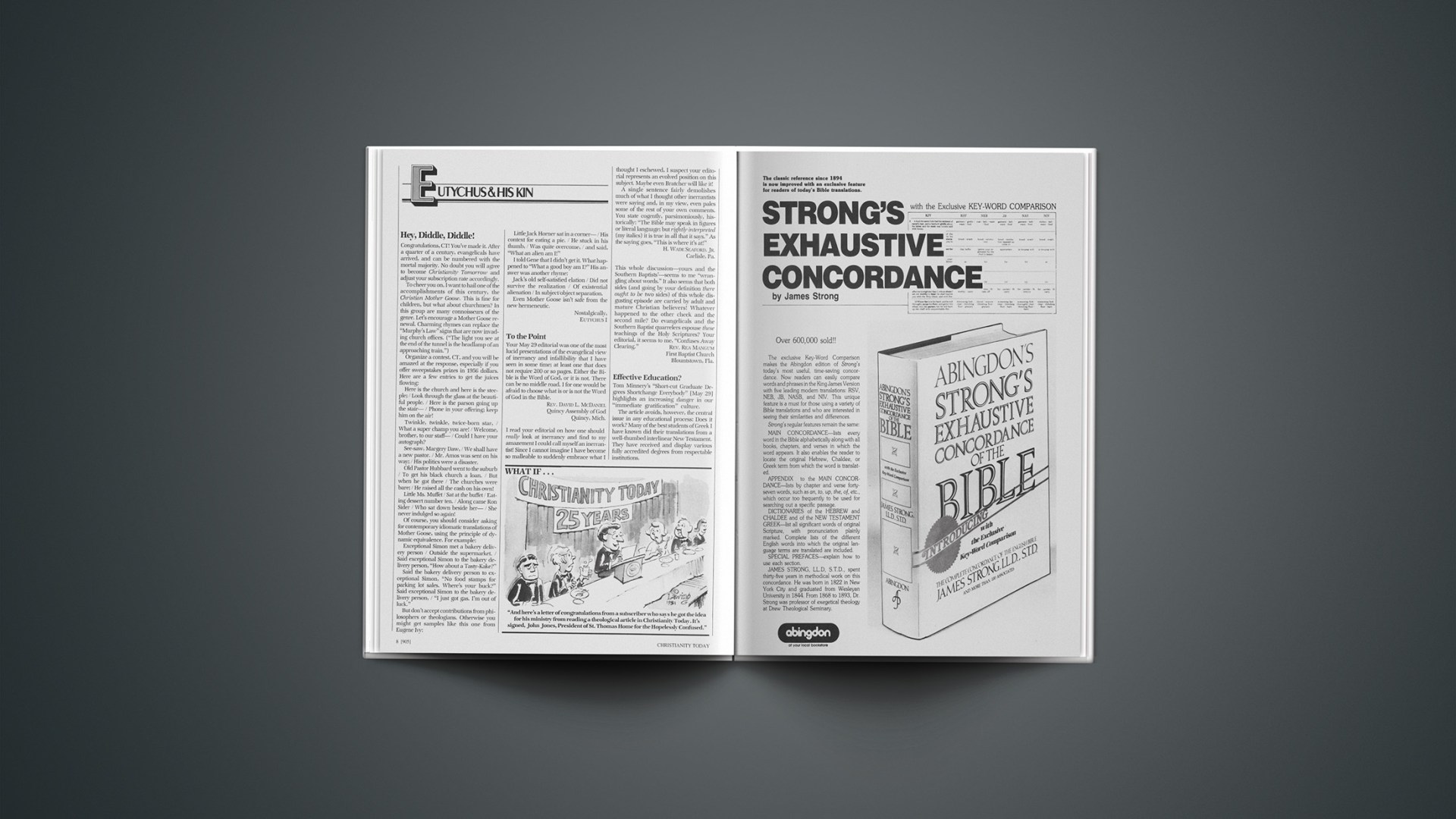Hey, Diddle, Diddle!
Congratulations, CT! You’ve made it. After a quarter of a century, evangelicals have arrived, and can be numbered with the mortal majority. No doubt you will agree to become Christianity Tomorrow and adjust your subscription rate accordingly.
To cheer you on, I want to hail one of the accomplishments of this century, the Christian Mother Goose. This is fine for children, but what about churchmen? In this group are many connoisseurs of the genre. Let’s encourage a Mother Goose renewal. Charming rhymes can replace the “Murphy’s Law” signs that are now invading church offices. (“The light you see at the end of the tunnel is the headlamp of an approaching train.”)
Organize a contest, CT, and you will be amazed at the response, especially if you offer sweepstakes prizes in 1956 dollars. Here are a few entries to get the juices flowing:
Here is the church and here is the steeple; / Look through the glass at the beautiful people. / Here is the parson going up the stair—/Phone in your offering; keep him on the air!
Twinkle, twinkle, twice-born star, / What a super champ you are! / Welcome, brother, to our staff—/Could I have your autograph?
See-saw, Margery Daw, / We shall have a new pastor. / Mr. Amos was sent on his way; / His politics were a disaster.
Old Pastor Hubbard went to the suburb / To get his black church a loan. / But when he got there / The churches were bare; / He raised all the cash on his own!
Little Ms. Muffet / Sat at the buffet / Eating dessert number ten. / Along came Ron Sider / Who sat down beside her—/She never indulged so again!
Of course, you should consider asking for contemporary idiomatic translations of Mother Goose, using the principle of dynamic equivalence. For example:
Exceptional Simon met a bakery delivery person / Outside the supermarket. / Said exceptional Simon to the bakery delivery person, “How about a Tasty-Kake?”
Said the bakery delivery person to exceptional Simon, “No food stamps for parking lot sales. Where’s your buck?” Said exceptional Simon to the bakery delivery person, / “I just got gas. I’m out of luck.”
But don’t accept contributions from philosophers or theologians. Otherwise you might get samples like this one from Eugene Ivy:
Little jack Horner sat in a corner—/His context for eating a pie. / He stuck in his thumb, / Was quite overcome, / and said, “What an alien am I!”
I told Gene that I didn’t get it. What happened to “What a good boy am I?” His answer was another rhyme:
Jack’s old self-satisfied elation / Did not survive the realization / Of existential alienation / In subject/object separation.
Even Mother Goose isn’t safe from the new hermeneutic.
Nostalgically,
EUTYCHUS I
To The Point
Your May 29 editorial was one of the most lucid presentations of the evangelical view of inerrancy and infallibility that I have seen in some time; at least one that does not require 200 or so pages. Either the Bible is the Word of God, or it is not. There can be no middle road. I for one would be afraid to choose what is or is not the Word of God in the Bible.
REV. DAVID L. MCDANIEL
Quincy Assembly of God
Quincy, Mich.
I read your editorial on how one should really look at inerrancy and find to my amazement I could call myself an inerrantist! Since I cannot imagine I have become so malleable to suddenly embrace what I thought I eschewed, I suspect your editorial represents an evolved position on this subject. Maybe even Bratcher will like it!
A single sentence fairly demolishes much of what I thought other inerrantists were saying and, in my view, even pales some of the rest of your own comments. You state cogently, parsimoniously, historically: “The Bible may speak in figures or literal language: but rightly interpreted (my italics) it is true in all that it says.” As the saying goes, “This is where it’s at!”
H. WADE SEAFORD. JR.
Carlisle, Pa.
This whole discussion—yours and the Southern Baptists’—seems to me “wrangling about words.” It also seems that both sides (and going by your definition there ought to be two sides) of this whole disgusting episode are carried by adult and mature Christian believers! Whatever happened to the other cheek and the second mile? Do evangelicals and the Southern Baptist quarrelers espouse these teachings of the Holy Scriptures? Your editorial, it seems to me, “Confuses Away Clearing.”
REV. REA MANGUM
First Baptist Church
Blountstown, Fla.
Effective Education?
Tom Minnery’s “Short-cut Graduate Degrees Shortchange Everybody” [May 29] highlights an increasing danger in our “immediate gratification” culture.
The article avoids, however, the central issue in any educational process: Does it work? Many of the best students of Greek I have known did their translations from a well-thumbed interlinear New Testament. They have received and display various fully accredited degrees from respectable institutions.
Did their certified schools actually educate them? Or is advanced education sometimes an exercise in mimicry, requiring only short-term retention of by-rote data? A committed Christian student who desires to be educated may well achieve that goal at an “unofficial” school. We must guard against disdain for the different, and evaluate our enshrined patterns.
DAVID L. FRISBIE
Overland Park, Kans.
Minnery’s statement concerning a “marked preference for the practical aspects of ministerial training at the expense of academic work” is incorrect. I have had my share of the purely academic, and it did not prepare me for the pastorate.
Many of us are not interested in simply hanging a diploma on the wall. We are interested in learning more about the practical aspects of ministry we did not get in college and/or seminary. I need no more academia. What I needed, and still need, is the practicality of what Luther Rice offered me at a time when it would have been impossible for me to go back to a seminary campus.
REV. HARVEY NOWLAND, JR.
Oakwood Baptist Church
Oakwood, Ga.
The Association of Theological Schools does not and has never had any theological tests for membership and accreditation. This is well demonstrated by the fact that the membership spans the entire spectrum of theological positions from the most conservative to the most liberal. Judgments are based solely on quality of educational program and adequacy of resources. Those who interpret ATS accrediting actions on theological grounds are simply uninformed about the facts or unwilling to accept them.
MARVIN J. TAYLOR
The Association of Theological Schools
Vandalia, Ohio
We wish to commend Minnery for his exposure of true “diploma mills” and bogus accrediting associations. However, one would get the impression that all “home study” higher education is inferior to the traditional classroom brand. Also, one would gather from the article that unless a Bible college or seminary were accredited or approved by a secular state and/or regional agency it would be by definition inferior and suspect of motives. Some objections and observations:
• Many “accredited” private and state undergraduate and graduate schools offer “home study” (external, directed) courses for credit.
• Much of graduate education is of the independent research nature.
• Many fundamental colleges and seminaries have serious philosophic prohibitions regarding state or regional approval or accreditation by secular authorities.
• Who decides what is quality education? Doesn’t it come from COPA [Council on Postsecondary Accreditation], which is controlled by a secular, humanistic, evolutionary philosophy?
• There are bona fide accrediting associations of Bible colleges that are seeking to improve their academic standards, although not recognized by COPA.
HAROLD E. BARNETT, HARRY E. WILLIAMS
Antietam Bible College
Hagerstown, Md.
The Unifying Spirit
I appreciated “Opening the Church to the Charismatic Dimension,” by Clark Pinnock [June 12]. I am a Pentecostal Christian by willing choice as a result of the ever-patient Lord of Glory. It is refreshing to see the freedom in the Spirit treated so openly. If Christians could see that the Holy Spirit was given not to embarrass individuals or divide Christianity but to give power, guidance, and comfort to all children of God, we could have the same ease of fellowship the early church enjoyed, and the increased addition of souls to the kingdom.
JERRY L. BROUGHTON
Springfield, Mo.
Pinnock’s article was a shocker not because of the insight of his premise, but his error in historical analysis! He states, “I have in mind the charismatic dimension of the apostolic teaching. To grasp it, let us look at Paul’s essay on spiritual gifts in 1 Corinthians 12 to 14. There we glimpse a congregation alive in the Spirit and abounding in gifts and manifestations.” Historically, the church at Corinth was split, morally in error, and doctrinally confused. One must only read the entire letter to this church to establish clearly the spiritual weakness and instability there. Because of his error of analysis and failure to exemplify the New Testament teaching of the power and maturity expected in the ministry of the Holy Spirit, his defense of charismatic dimension lacks validity.
DR. DALLAS E. SHAFER
Christian Church of Security
Security, Colo.
Knowing And Doing
The “tell them what’s right” teaching method Larsen critiques, “Listening to Our Children, that They Might Believe” [May 29], is reflective of the philosophy of education evangelicals have adopted: to know right is to do right. While many in evangelical education would deny embracing that philosophy, the educational methods of those very persons and the classroom structures they most often employ repudiate their denial. The question is, when will evangelical educators translate what they profess to know about Christian education into methodology? O well, to know right is not to do right after all, is it?
JAMES P. BOWERS
Cleveland, Tenn.










